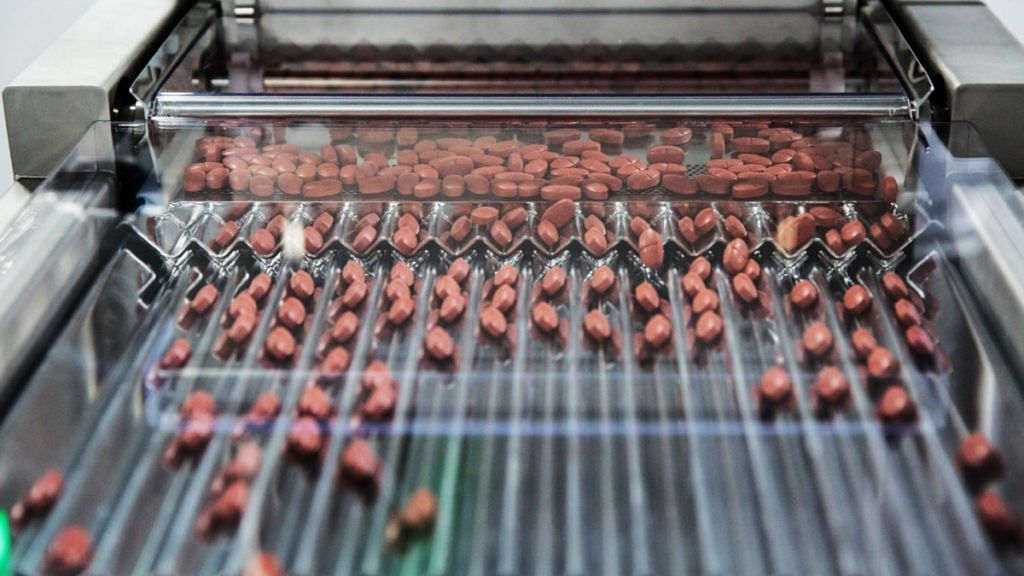New Delhi: The Modi government Thursday decided to do away with the criteria of ‘minimum investment’ and ‘barring exports’ in the Production-Linked Incentive (PLI) scheme meant to boost the domestic production of raw material for making medicines in India.
The move is set to encourage more drugmakers to apply for the scheme and boost production of active pharmaceutical ingredients (APIs) used in making medicines, such as paracetamol that is the API for Crocin.
The government had in March approved the PLI scheme to reduce India’s dependence on China for APIs to produce crucial antibiotics, anti-HIV drugs, vitamins, and cardio medicines.
Indian drugmakers import around 70 per cent of their total bulk drugs from China.
The scheme comes with financial implications worth Rs 6,940 crore for the next eight years.
Also read: Depending on China for imports could threaten India’s drug security: Export council DG
Change in plans
To encourage the participation of drug and medical device makers in the scheme, the government has now removed the eligibility criteria of ‘minimum investment’.
Earlier, the scheme was beneficial only for manufacturers who could ensure ‘higher production capacities’.
The same revisions were made in the PLI scheme for medical device makers with an intent to boost the local production of high-tech devices in the country.
According to the press statement issued by the government’s Department of Pharmaceuticals (DoP), the criteria of a ‘minimum threshold’ investment has been replaced with ‘committed’ investment. A committed investment is if a manufacturer agrees to invest Rs 50 crore. Such a candidate can avail the PLI incentive after making the full investment.
“The change has been made to encourage efficient use of productive capital as the amount of investment required to achieve a particular level of production depends upon choice of technology and it also varies from product to product,” the statement said.
The DoP is an apex body under the Ministry of Chemicals and Fertilizers that formulates policies for drugs and medical devices industry in India.
Also read: What are APIs and how they threaten India’s status of a ‘pharmacy to the world’
Deadlines extended, minimum production reduced
APIs, popularly known as bulk drugs, produced under the scheme will now also be allowed for exports apart from sales in the domestic market.
The other highlights of the revised guidelines is the change in the minimum annual production capacity for 10 products, including antibiotics such as tetracycline, neomycin, ciprofloxacin and blood thinning agent, Aspirin.
The government has extended the deadline for the submission of the application by a week from 23 November to 30 November.
What triggered the change
In August, the DoP released the guidelines for the PLI scheme. After the issuance, the department received several suggestions and inputs from the pharmaceutical and medical device industry “seeking certain amendments in the scheme to enable effective participation of the industry in the two schemes”, according to the government’s press statement.
Based on the industry request, the government decided to allow exports of bulk drugs.
“Deletion of the provision which restricts the sales of eligible products to domestic sales only, for the purpose of eligibility of receiving incentives, bringing the scheme in line with other PLI schemes and encouraging market diversification,” stated the revised guidelines.
“Other sectors which have launched PLI schemes before have included the export criteria in their guidelines. Considering the industry’s request, we have decided to allow the export of bulk drugs produced under the scheme,” a senior DoP official said.
The suggestions were examined by the respective Technical Committees formed under the schemes, the government release informed.
The recommendations of the committees were placed before the Empowered Committees of the schemes, which are chaired by Amitabh Kant, CEO, NITI Aayog.
Also read: Cheers to health! This was a decade of drug breakthroughs – from Cancer to Hepatitis C
